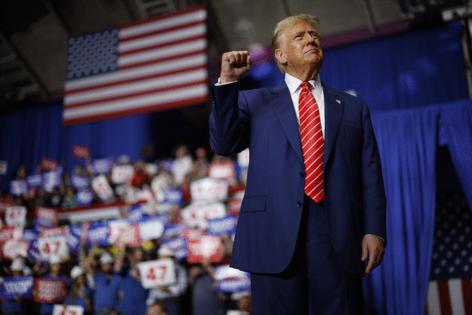America can only hope Trump's not serious about blowing up trade partnerships
Published in Political News
It’s telling that virtually the only positive spin economists of every political persuasion are putting on Donald Trump’s latest vow to ignite a global tariff war is the possibility that he doesn’t actually mean it. This is one instance in which Trump’s well-established tendency to say things he knows aren’t true is America’s best hope of avoiding a self-inflicted national economic injury.
It’s beyond ironic that Trump — whose recent election to a second term was helped immeasurably, maybe decisively, by high inflation under Joe Biden’s presidency — has made aggressive tariffs a centerpiece of his economic agenda. Those fees on imported foreign goods will inevitably be passed onto American consumers in the form of higher prices. They might also hurt America’s manufacturing sector, as Missouri in particular learned from Trump’s first-term tariff-mania.
Trump promised throughout this year’s presidential campaign to hit global friends and foes alike with high new tariffs as a misguided lever to protect American jobs. But even many of his supporters dismissed it as typical Trumpian bluster designed to make him sound tough on the campaign trail.
What happened last week cannot be so easily shrugged off. Trump announced on his Truth Social platform that he will, immediately upon taking office on Jan. 20, hit Mexico and Canada each with 25% tariffs, and another 10% on top of existing tariffs against China.
He linked the Mexico and Canada tariffs specifically to immigration and drug trafficking: “This Tariff will remain in effect until such time as Drugs, in particular Fentanyl, and all Illegal Aliens stop this Invasion of our Country!”
Trump is basing a radical policy announcement against America’s two biggest trading partners on the utter fabrication that illegal immigrants are “bringing Crime and Drugs at levels never seen before.”
He’s also mischaracterizing the very real fentanyl crisis as being tied to immigration. In fact, more than 85% of people sentenced for cross-border trafficking of fentanyl in 2023 were U.S. citizens, according to a study by KFF. As aptly laid out last week by the Wall Street Journal’s staunchly conservative editorial board, “Mr. Trump is threatening the countries, including two neighbors and allies, with economic harm if they don’t help him solve a domestic U.S. problem.”
Reasonably structured tariffs have a legitimate place in trade policy, but Trump’s view of them as clubs to be swung around indiscriminately at trading partners ignores some crucial complexities.
First, tariffs are by definition a tax on American consumers. Trump spent much of this year’s campaign publicly insisting that targeted countries would have to pay his promised tariffs, indicating he either doesn’t understand how tariffs work or (more likely) was assuming his audiences don’t.
In fact, tariffs are paid by U.S. importers, which then pass the cost on in the form of higher prices for goods — as consumers discovered during Trump’s first term. Among his trade policies were targeted tariffs on imported washing machines, which was meant to bolster U.S. manufacturing but which primarily just drove up prices across the entire U.S. market.
Trump’s planned tariffs against Mexico and Canada would do even more damage to Americans’ pocketbooks. Together, those two countries provide roughly one-third of all the fruits and vegetables sold in the U.S. Those produce prices would rise immediately as importers pass the tariffs on to American distributors and grocers. Meanwhile, tariffs on Canadian petroleum could drive up U.S. gas pump prices by as much as 75 cents a gallon by some estimates.
And that’s before even getting into the impact that likely retaliatory tariffs from those countries would have on foreign sales of American goods. Mexican President Claudia Sheinbaum immediately threatened such retaliation after Trump’s announcement last week.
Even under a best-case scenario in which Trump is merely threatening tariffs as a bargaining chip on trade and other issues, the threat alone is typically reckless. U.S. automobile manufacturers are especially jittery about the possibility of new tariffs, since that industry’s supply chain crosses national borders repeatedly with the making of virtually every car. No wonder General Motors’ shares plummeted last week after Trump’s announcement.
Since most major manufacturing today involves supply chains that span national borders, even policies that spur U.S. manufacturing can also hurt it. Missouri saw that firsthand during Trump’s first term, when the Noranda Aluminum plant, in the Bootheel, was initially aided by tariffs on foreign competition — only to see those same tariffs spur major shifts in the global aluminum supply chain that ended up devastating the Missouri company’s sales.
As it happens, Missouri has two Republican senators and a half-dozen House members who, to one degree or another, have Trump’s ear or the ears of those around him. Should he go through with this reckless tariff binge, and those members of Congress do nothing to oppose it, let no one forget that abrogation of duty when local prices rise and jobs are lost.
_____
©2024 STLtoday.com. Distributed by Tribune Content Agency, LLC.




























































Comments